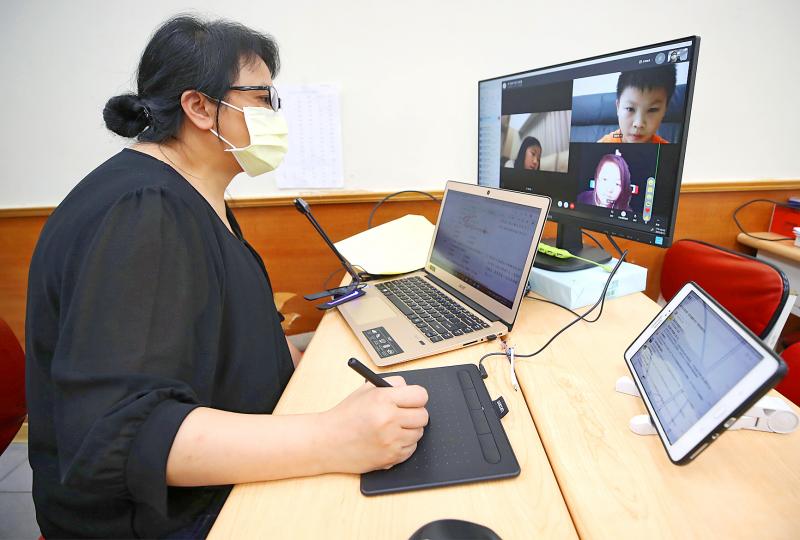Major PC vendors expect a shortage of key components to last another 12 months until the second quarter of next year, when PC demand wanes after two years of robust expansion, a UBS analyst said yesterday.
Concern has risen among investors that PC demand could weaken as the US and European economies reopen from COVID-19 lockdowns and gradually return to in-person business activities.
At the annual Taiwan Conference that began on Monday, UBS analysts said they had similar discussions with companies in PC supply chains, and the feedback from major PC vendors indicated that demand remained quite strong on the back of slim inventories of two to three weeks, compared with the normal six to eight weeks.

Photo: CNA
PC supply still lagged consumer demand, with a gap of 20 to 30 percent, UBS head of Taiwan hardware industry Grace Chen (陳星嘉) told a virtual media briefing.
Key component supply constraints remain the choke point, she added.
“For PCs, the component shortage is mainly IC related, like driver ICs and power management ICs. The panel shortage is not very serious now,” Chen said in an e-mail to the Taipei Times
She expects global PC shipments to continue growing at a double-digit percentage sequentially this quarter and next quarter before decelerating in the second half of this year.
For the full year, global PC shipments are forecast to grow between 10 and 20 percent annually, Chen said, adding that growth would be slower next year.
As major PC vendors unanimously expect key component supply constraints to start easing in the second quarter next year, PC supply and demand could reach a parity by then, she said.
Aside from the PC industry, electric vehicles might be a new growth driver for local hardware manufacturers, Chen said.
The production value of electric vehicles, which consume many more chips and electronic components than conventional vehicles, is expected to be double or triple that of PCs and mobile phones combined in the next 10 years, she said.
Electric vehicles are one key area that Hon Hai Precision Industry Co (鴻海精密), an iPhone assembler, has been investing in to secure growth, chairman Young Liu (劉揚偉) said in his keynote speech at the conference.
Hon Hai last year cofounded an electric vehicle development alliance called MIH, which now has more than 1,600 members from the auto, electronics and software sectors, he said.

Taiwan Transport and Storage Corp (TTS, 台灣通運倉儲) yesterday unveiled its first electric tractor unit — manufactured by Volvo Trucks — in a ceremony in Taipei, and said the unit would soon be used to transport cement produced by Taiwan Cement Corp (TCC, 台灣水泥). Both TTS and TCC belong to TCC International Holdings Ltd (台泥國際集團). With the electric tractor unit, the Taipei-based cement firm would become the first in Taiwan to use electric vehicles to transport construction materials. TTS chairman Koo Kung-yi (辜公怡), Volvo Trucks vice president of sales and marketing Johan Selven, TCC president Roman Cheng (程耀輝) and Taikoo Motors Group

Among the rows of vibrators, rubber torsos and leather harnesses at a Chinese sex toys exhibition in Shanghai this weekend, the beginnings of an artificial intelligence (AI)-driven shift in the industry quietly pulsed. China manufactures about 70 percent of the world’s sex toys, most of it the “hardware” on display at the fair — whether that be technicolor tentacled dildos or hyper-realistic personalized silicone dolls. Yet smart toys have been rising in popularity for some time. Many major European and US brands already offer tech-enhanced products that can enable long-distance love, monitor well-being and even bring people one step closer to

RECORD-BREAKING: TSMC’s net profit last quarter beat market expectations by expanding 8.9% and it was the best first-quarter profit in the chipmaker’s history Taiwan Semiconductor Manufacturing Co (TSMC, 台積電), which counts Nvidia Corp as a key customer, yesterday said that artificial intelligence (AI) server chip revenue is set to more than double this year from last year amid rising demand. The chipmaker expects the growth momentum to continue in the next five years with an annual compound growth rate of 50 percent, TSMC chief executive officer C.C. Wei (魏哲家) told investors yesterday. By 2028, AI chips’ contribution to revenue would climb to about 20 percent from a percentage in the low teens, Wei said. “Almost all the AI innovators are working with TSMC to address the

Malaysia’s leader yesterday announced plans to build a massive semiconductor design park, aiming to boost the Southeast Asian nation’s role in the global chip industry. A prominent player in the semiconductor industry for decades, Malaysia accounts for an estimated 13 percent of global back-end manufacturing, according to German tech giant Bosch. Now it wants to go beyond production and emerge as a chip design powerhouse too, Malaysian Prime Minister Anwar Ibrahim said. “I am pleased to announce the largest IC (integrated circuit) Design Park in Southeast Asia, that will house world-class anchor tenants and collaborate with global companies such as Arm [Holdings PLC],”